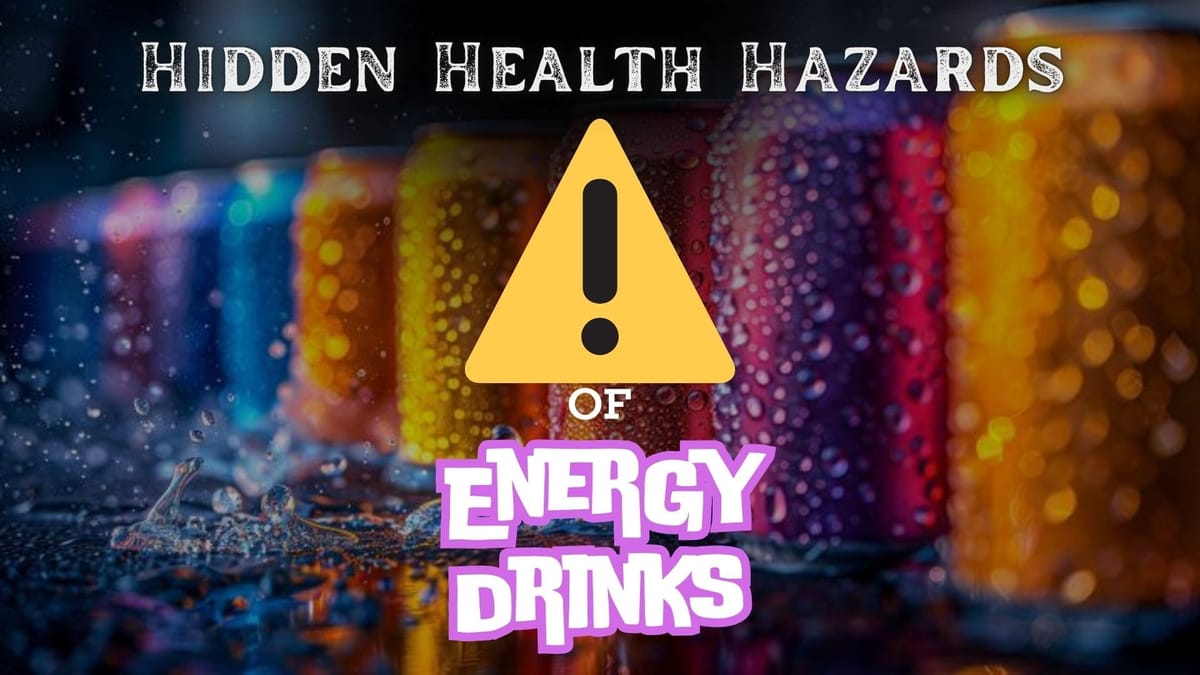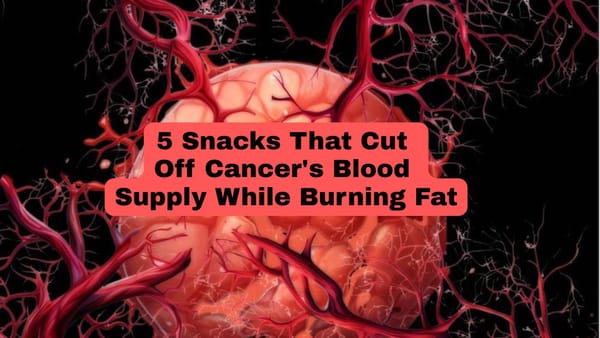Energy Drinks: The Hidden Health Hazards
Unlike sports drinks designed to replenish fluids and electrolytes, energy drinks are characterized by their high caffeine content and the inclusion of other stimulant compounds.

In recent years, energy drinks have surged in popularity, becoming a go-to beverage for many children, teenagers, and adults seeking a quick energy boost. These brightly coloured cans promise enhanced alertness, improved physical performance, and increased mental focus. However, beneath their vibrant packaging and enticing marketing lies a concerning reality: energy drinks can pose significant health risks to consumers of all ages.
This article aims to shed light on the composition of energy drinks, their effects on children and adults, and the risks of mixing them with alcohol. By exploring current research and expert opinions we hope to provide a comprehensive overview to help readers make informed decisions about their energy drink consumption.
WHAT ARE ENERGY DRINKS?
Definition and Composition
Energy drinks are non-alcoholic beverages marketed to improve energy, stamina, athletic performance, and concentration. Unlike sports drinks designed to replenish fluids and electrolytes, energy drinks are characterized by their high caffeine content and the inclusion of other stimulant compounds.
The typical ingredients found in energy drinks include:
- Caffeine: The primary active ingredient, often in much higher concentrations than coffee or soda.
- Sugar: Many energy drinks contain high amounts of sugar or artificial sweeteners.
- Taurine: An amino acid that supports neurological development and helps regulate water and mineral levels in the blood.
- B-vitamins: Including B3 (niacin), B6 (pyridoxine), and B12 (cobalamin).
- Guarana: A plant extract that contains caffeine, theobromine, and theophylline.
- Ginseng: A herb often touted for its effects on memory and energy levels.
- L-carnitine: An amino acid involved in fatty acid metabolism.
- Glucuronolactone: A naturally occurring chemical believed to fight fatigue and provide a sense of well-being.
It is important to note that while some of these ingredients are found naturally in foods, the concentrations in energy drinks are often much higher and their interactions are not fully understood.
Caffeine Content Comparison
Some energy drinks can contain up to 300 mg of caffeine per can, equivalent to three cups of coffee in one sitting. This high concentration of caffeine, combined with other stimulants, can lead to various health issues, especially when consumed in large quantities or by sensitive individuals.

Health Risks for Children
The consumption of energy drinks by children and adolescents is particularly concerning due to their developing bodies and brains. The risks associated with energy drink consumption in this age group can be categorized into physical and mental health risks.
Physical Health Risks
- Increased heart rate and blood pressure: The high caffeine content in energy drinks can cause rapid heartbeat and elevated blood pressure in children, potentially leading to arrhythmias or other cardiovascular issues.
- Risk of obesity and type 2 diabetes: Many energy drinks are loaded with sugar, with some containing up to 60 grams per 16 oz can. Regular consumption can contribute to weight gain, insulin resistance, and an increased risk of developing type 2 diabetes.
- Dental erosion: The combination of high sugar content and acidic ingredients in energy drinks can lead to severe dental erosion, damaging tooth enamel and increasing the risk of cavities.
- Dehydration: Despite being a liquid, the caffeine in energy drinks acts as a diuretic, potentially leading to dehydration, especially if consumed instead of water during physical activities.
- Caffeine toxicity: Children and adolescents have a lower tolerance for caffeine. Overconsumption can lead to caffeine toxicity, symptoms of which include nausea, vomiting, seizures, and in severe cases, death.
Mental Health Risks
- Anxiety and insomnia: The high caffeine content can exacerbate anxiety symptoms and disrupt sleep patterns, leading to insomnia. This is particularly problematic for children who require adequate sleep for proper development and academic performance.
- Behavioral issues: Some studies have linked energy drink consumption in children to increased risk-taking behaviours, aggression, and attention problems.
- Effects on cognitive development: While research is ongoing, there are concerns that regular energy drink consumption could interfere with normal brain development in children and adolescents.
- Academic performance: Although energy drinks are often marketed as aids for studying, the crashes that follow the initial energy boost can lead to decreased concentration and poorer academic performance in the long run.
- Addiction and dependence: Early exposure to high caffeine levels can lead to dependence, setting the stage for potential substance abuse issues later in life.
It's worth noting that many of these risks are dose-dependent and can be exacerbated by factors such as individual sensitivity to caffeine, pre-existing health conditions, and the frequency of consumption.

Health Risks for Adults
While adults may have a higher tolerance for caffeine compared to children, they are not immune to the health risks associated with energy drink consumption. The dangers for adults are particularly centered around cardiovascular health and the potential for dependence.
Cardiovascular Concerns
- Heart rhythm disturbances: High doses of caffeine can lead to irregular heartbeats or arrhythmias. This is especially dangerous for individuals with pre-existing heart conditions or those taking certain medications.
- Increased risk of myocardial infarction: A 2019 study published in the Journal of the American Heart Association found that energy drink consumption can increase the risk of electrical disturbances in the heart and lead to elevated blood pressure. These effects could potentially trigger a heart attack, especially in young adults who might not be aware of underlying heart conditions.
- Hypertension: Regular consumption of energy drinks has been linked to sustained increases in blood pressure, which is a major risk factor for heart disease and stroke.
- Endothelial dysfunction: Some research suggests that energy drinks may impair the function of blood vessels, potentially leading to decreased blood flow and increased risk of cardiovascular events.
- Increased platelet aggregation: There's evidence that energy drinks may increase the stickiness of blood platelets, potentially raising the risk of blood clots.
Dependence and Withdrawal Symptoms
- Caffeine dependence: Regular consumption of high-caffeine energy drinks can lead to physical dependence. The brain adapts to the regular influx of caffeine, leading to tolerance and the need for increasing amounts to achieve the same effects.
- Withdrawal symptoms: When a habitual energy drink consumer suddenly stops or reduces their intake, they may experience withdrawal symptoms such as:
- Severe headaches
- Fatigue
- Difficulty concentrating
- Irritability
- Depressed mood
- Tremors
- Cycle of dependence: The presence of withdrawal symptoms often leads individuals to consume more energy drinks to alleviate these symptoms, creating a cycle of dependence.
- Impact on sleep quality: Even if consumed earlier in the day, the high caffeine content of energy drinks can disrupt sleep patterns, leading to insomnia or poor sleep quality. This, in turn, can create a reliance on energy drinks to combat daytime fatigue.
- Masking underlying health issues: The stimulant effects of energy drinks may temporarily mask symptoms of underlying health conditions or sleep disorders, potentially delaying diagnosis and treatment.
It's important to note that while these risks exist, they are often associated with excessive or long-term consumption of energy drinks. Moderate, occasional use may not pose significant risks for healthy adults. However, individuals with pre-existing health conditions, pregnant women, and those sensitive to caffeine should exercise caution or avoid energy drinks altogether.
The Dangers of Mixing Energy Drinks with Alcohol
Increased Risk-Taking Behaviors
- Binge drinking statistics: Studies have shown that individuals who mix energy drinks with alcohol are more likely to engage in binge drinking. A 2017 study published in the Journal of Adolescent Health found that college students who consumed alcohol mixed with energy drinks were up to 6 times more likely to engage in binge drinking compared to those who consumed alcohol alone.
- Higher likelihood of engaging in risky behaviours: The combination of alcohol and energy drinks has been associated with an increased likelihood of:
- Drunk driving: Individuals who consume alcohol mixed with energy drinks are more likely to get behind the wheel while intoxicated.
- Unprotected sex: The risk of engaging in unprotected sexual activity increases, potentially leading to unintended pregnancies and sexually transmitted infections.
- Physical altercations: There's a higher likelihood of getting into fights or other violent confrontations.
- Other substance use: Mixing alcohol and energy drinks is associated with a greater likelihood of using other drugs.
- Extended drinking sessions: The stimulant effects of energy drinks can mask the depressant effects of alcohol, leading to longer drinking sessions and higher overall alcohol consumption.
Perception of Intoxication
- Masking alcohol effects: The caffeine and other stimulants in energy drinks can counteract the sedative effects of alcohol, making drinkers feel more alert and less drunk than they are.
- Impaired judgment: While individuals may feel less intoxicated, their cognitive functions and motor skills are still impaired by alcohol. This false sense of sobriety can lead to poor decision-making and dangerous situations.
- Delayed alcohol absorption: Some studies suggest that the carbonation in energy drinks might speed up the absorption of alcohol into the bloodstream, potentially leading to faster intoxication.
- Dehydration: Both alcohol and caffeine have diuretic effects, potentially leading to severe dehydration when consumed together. This can exacerbate the negative effects of alcohol and increase the severity of hangovers.
- The Strain on the cardiovascular system: The combination of alcohol (a depressant) and energy drinks (a stimulant) can put additional stress on the heart, potentially leading to irregular heart rhythms or other cardiovascular issues.
It's crucial to note that many countries and jurisdictions have banned or restricted the sale of pre-mixed alcoholic energy drinks due to these health concerns. However, manually mixing these beverages remains a common practice, especially among young adults.





